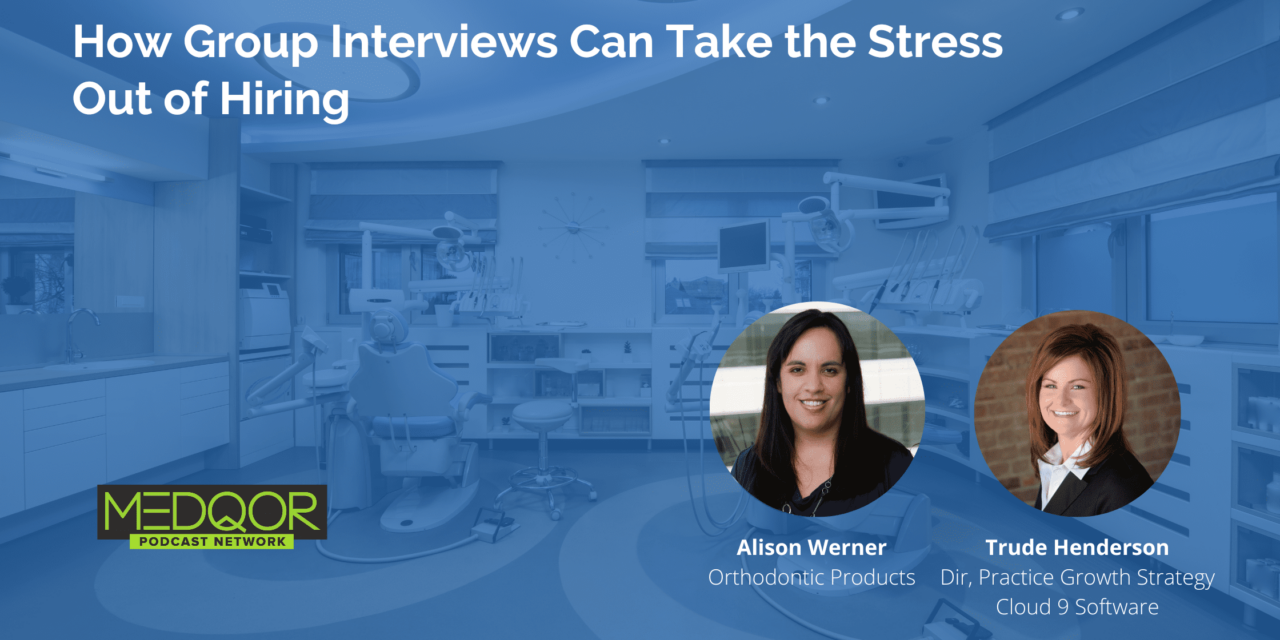The staffing crisis is one of the top challenges facing orthodontic practices. At a time when so many orthodontic practices need to hire team members, there is a noticeable shortage of qualified applicants. So, when a job ad produces some viable candidates, it’s up to the practice hiring team to vet those candidates for the best match. And one way to make a stressful process less so for the hiring team: group interviews.
In this podcast, we look at the hiring crisis and talk about why group interviews can be key to making the hiring process more effective and efficient for the hiring team.
To do that, Alison Werner, Orthodontic Products’ chief editor, is joined by Trude Henderson, director of practice growth strategy for Cloud 9 and founder of the company’s recent acquisition, ToothFairy—a customer experience management software designed for orthodontic practices. Henderson, who worked with orthodontic practices as both a manager and consultant before launching ToothFairy in March 2020, talks about hiring trends in the orthodontic industry and shares strategies for finding the best candidate.
When it comes to hiring trends, they discuss:
- How the explosion of virtual jobs is eating into the traditional candidate pool,
- How more practices are being “ghosted” during the hiring process, and
- How burnout among current employees who are picking up the slack of being short staffed is leading to dissatisfaction.
When it comes to hiring, Henderson offers her advice on where to search for candidates. Yes, while Indeed, ZipRecruiter, and Craigslist can be good sources, she recommends looking to current employees and incentivizing them to recommend friends or family. Not only does it expand the applicant pool, but it also can have a positive effect on the current employee. As Henderson points out, research shows that employees who have a best friend at work are much more engaged.
From there, Werner and Henderson turn to the interview process itself. Henderson advocates for group interviews. A common practice in industries interviewing candidates for sales positions and other customer-facing roles, Henderson says group interviews are a great initial screening tool for the orthodontic practice. She points to the fact that they can be not only save the practice time and money, but they can also be effective for assessing candidates sales and team skills. And as Henderson puts it, “In my opinion, every team member that interacts with patients in your practice should possess great sales skills.”
Henderson walks listeners through the group interview process, the virtues of conducting group interviews online, and who from the practice staff should take part in the group interview. She also lays out what the hiring team should be looking for from candidates—both the verbal and non-verbal cues. And she explains why the hiring team shouldn’t hold it against an applicant if they join the interview from their phone in their car.
And what if after all those group interviews you just don’t find the right match, Henderson offers advice and points out that another advantage of the group interview is you can move more quickly through the bad fits than if you had done one-on-one interviews. OP
Claim your free group Interview Template below
Podcast Transcript
Alison Werner:
Hello, I’m Alison Warner. I’m the chief editor of Orthodontic Products. Thank you for joining me for this episode of the Orthodontic Products Podcast on the MEDQOR Podcast Network. Today we’re going to talk about a hot topic in the orthodontic industry: hiring. Earlier this year, we published the results of an orthodontic practice performance survey, and when we asked orthodontists about the top challenges facing their practice, staffing was a significant one. More than 85% of respondents reported that they believe there is a shortage of orthodontic staff available to hire. And what’s more, 66% of orthodontists surveyed reported that they were currently seeking to hire orthodontic team members.
Alison Werner:
All this means is that when orthodontic practices like yours find viable candidates, the onus is going to be on the hiring team to make the right choice. Key to all this is the interview process, and that can be a stressful experience, not only for the applicant, but also for the orthodontic practice’s hiring team.
Alison Werner:
So with that in mind, we asked Trude Henderson to join us today to talk about the hiring and interview process and how to take some of the stress out. Trude is the Director of Practice Growth Strategy for Cloud9 and founder of the company’s recent acquisition, ToothFairy, a customer experience management software design for orthodontic practices. Now, one of the areas ToothFairy addresses is hiring, training, and retaining talent in the orthodontic practice. Trude, thank you for joining me today.
Trude Henderson:
Thank you.
Alison Werner:
Let’s get started. As I mentioned, Cloud9 recently acquired ToothFairy, and you are the founder of ToothFairy. I know from reading up on the company that it was designed to address the five biggest problems facing orthodontists today. Can you explain what those problems are and how ToothFairy helped solve them?
Trude Henderson:
Sure. Let me start with this. So ToothFairy launched in March of 2020, about two weeks after the stay at home orders in the San Francisco Bay area after many, many years of research and hands on work in the orthodontic practices as a manager and consultant. So before I started the ToothFariy development, I needed to ensure that I was solving for the right problems. So I set out to survey orthodontists across the United States. And to my delight, about 500 of them responded and validated the top five challenges that I was seeing locally. These problems consist of things like losing patients to competition, hiring and retaining talent that we’re going to talk about today, winning new patients, recalls falling through the cracks, and finally, leading and motivating teams.
Trude Henderson:
We solve all of these problems with a simple, user friendly tool that incorporates concepts borrowed from my wonderful 35 year career in healthcare and nuclear aerospace, as well as other sales industries. So you’ve heard of Salesforce and HubSpot, right?
Alison Werner:
Yeah.
Trude Henderson:
We’re not reinventing the wheel here. We are simply tailoring a solution so that orthodontists can better serve their patients and generate more revenue faster.
Alison Werner:
Okay. So what does the addition of ToothFairy to the Cloud9 platform mean for orthodontic practices? Who are Cloud9’s customers currently?
Trude Henderson:
Well, it’s exciting, because it really means more predictability, more repeatability, and more scalability. So orthodontists finally have access to a robust customer experience management tool that leverages patient data and proactively keeps patients from falling through the cracks. I mean, our new patient orthodontic workflow is over a hundred years old, and a lot of things have changed over the years, especially in the last couple of years. Needless to say, we are way overdue for a tool that helps us work smarter, not harder, and gives us time back that we need, we desperately need, for other things. So orthodontists can really expect a better emotional connection with their patients, and more revenue faster.
Alison Werner:
Okay. Well, let’s dive into our topic, hiring. And as you’ve worked with orthodontic practices, even just over the last year, what have you been hearing from them when it comes to hiring?
Trude Henderson:
A lot. I’m out there on all the social media platforms, and competition is fierce. There’s a shortage of qualified candidates. I’ve heard that some employees are exiting the dental industry and have exited the dental industry, just exacerbating the problem. They’re leaving some of them to work more convenient virtual jobs that pay more. Some of them don’t like the requirements to wear a mask, say, front desk employees. This has caused some of them to explore their options, and many are not returning. Hiring managers are complaining of losing candidates to competition before they’re even able to fully assess them in the interview process and make a decision. Dentists are offering top dollar and scooping them up quickly. And then really the explosion of the virtual jobs, This is something that I’ve seen a lot of and it’s going on in every industry. Regardless if candidates have the experience, they’re scooping them up, paying them more, and especially if they’re not given the opportunity to work from home.
Alison Werner:
I’ve definitely heard the same thing when I’ve been talking to practices. Are there any other trends you’ve noticed around this staffing crisis?
Trude Henderson:
Yes. One of the biggest one that comes to mind is called ghosting in the workplace.
Alison Werner:
Oh, yes.
Trude Henderson:
Ghosting just simply means that one party vanishes from the interview process or the job even without warning. I just can’t believe this is happening. But I did a little bit of research on it a few months ago because I saw it happening again. It’s just a continuous thing. Research revealed that over 76% of employers have been ghosted. But I’ve never talked to an Ops manager that hasn’t been ghosted. But what was even more surprising to me though, is the fact that the research revealed that this disappearing act is not one sided. So more and more employers are ghosting candidates. It is easier than one might think, because practice managers and hiring managers wear many hats in a dental practice. So it’s easier than you might think.
Trude Henderson:
Another trend that I’ve noticed is burnout with employees. So burnout is not only about working the long hours or being short staffed, it’s also related to employees feeling unappreciated or a fundamental disconnect between the workers and the practice mission that really motivates them.
Alison Werner:
Yeah, absolutely. No, I’ve heard the exact same thing, and it gets into the whole issue of retention. Well, let’s move forward a little bit here. So how do you recommend practices go about the applicant search to find the best candidates today? Because we talked a little bit about how they’re looking for virtual jobs, and it’s a little bit of a generation shift. What do you recommend?
Trude Henderson:
It all depends on the local market and where candidates are looking for jobs. So I’ve had luck with a variety of online sources, sources like Indeed, ZipRecruiter, Craigslist. I recommend that practices experiment and use what works best for them at that time, because it does and will change. Some of my clients have tried recruiting agencies, too. It can be a little pricey, but it can be effective.
Trude Henderson:
But one of my favorite sources is the employees in the practice. I like to offer a $200 finder’s fee if an employee is referred and hired and makes it past their 90 day probation. I was fortunate to work with the Gallup Survey Company years ago and utilize many of their products, and they have a world renowned survey called Q12. I encourage the listeners to Google Q12, use it as much as you can. It is a wonderful tool. We could probably have a whole nother podcast on that. But one of the questions is, “Do you have a best friend at work?” And they have data to support that when employees have a best friend at work, they’re much more engaged.
Trude Henderson:
I’ve seen this personally, and I’ll share a quick story. So I had a practice that had an employee who took an excessive, and I mean an excessive amount of sick leave that unfortunately they couldn’t do anything about. But when the practice hired her daughter, she became more and more reliable and engaged. So it is definitely true that having someone close to you at work can make a difference.
Alison Werner:
Yeah, I would totally agree with that, just from my own personal position in my field. So once practices have an applicant, have a group of applicants, how should they be vetting them for the next stage? Or even just that initial vetting, how should they be vetting them?
Trude Henderson:
It’s great to take a look at their resume, and I use the word shiny resume. Don’t be distracted by too much fluff on their resume, but look for good qualities like relationship building. What’s their experience? I love to hire for attitude and train for skill. So if I’m hiring a treatment coordinator or a front office employee, I’m okay with hiring someone without dental experience, especially now that I have ToothFairy because I can speed up-
Alison Werner:
Oh, okay.
Trude Henderson:
… yeah, I can speed up that onboarding process 86% with ToothFairy. And we’ll talk about this more, I’m sure, later. We want to make sure that we’re hiring for sales skills. So relationship building, the ability to ask the right questions and overcome objections. You want to look, “Do they have any retail experience?” I don’t always pay a lot of attention the last couple of years to the length of their employment, especially due to COVID. It can be a little choppy over the last few years, and I found great candidates that still had a really choppy resume. But you want to look for some of their skills. Do they have communication skills? What have they done to maybe further their education? Things like that.
Alison Werner:
Okay. So that gets them to the interview process. And so when it comes to that, most practices will do a one-on-one interview, but you actually advocate for group interviews, which are more common for sales positions and other customer facing roles. Why?
Trude Henderson:
Yeah, absolutely. I prefer group interviews as part of the initial screening tool. Sometimes it’s very helpful to hire even on the spot, depending on the need and how quickly you need someone, and offer a sign-on bonus. The group interview process that I propose is a huge time saver. It’s very efficient, saves a practice money; not to mention is very effective in assessing the candidates sales skills and team skills. And in my opinion, every team member that interacts with patients in your practice should possess great sales skills. I mean, you can interview a group of candidates quickly, compare those candidates side by side, and really just allow the cream of the crop just to rise to the top. We can do that especially and easily with my simple role play exercise. If your candidates don’t have great sales skills, then there’s no need to waste anybody’s time and take them to the next step in the process, that those skills should always be number one.
Alison Werner:
Well, we’re going to talk about that role playing exercise in a second. But before we get there, you also recommend putting in the job posting that there will be group interviews so applicants see it at the start. Why do you recommend this approach?
Trude Henderson:
I do educate them and inform them about what a group interview is, because most of them don’t have any knowledge of that. In fact, they’re a little bit surprised by it. We want them to know what to expect. Many will opt out on their own, and that’s great. I would say maybe not many, but some will opt out, and that even makes the process even more efficient. But one thing that I don’t tell them is that they’ll be asked to participate in a role play exercise. The reason that I don’t disclose this in advance is because I have had candidates tell me that they didn’t realize they were great at selling until they had the courage to give it a try during the interview. And if I had told them, they may not have attended. So we’re really looking for a diamond in the rough.
Alison Werner:
Exactly. Well, is there anything else that you recommend including in that initial job ad?
Trude Henderson:
Yes. So I always let the candidates know that they may be a good fit if they have experience in areas like high end retail, teaching, coaching, et cetera, as well as experience in debate and theater even. One of the role play exercises that I conduct for treatment coordinators is the ToothFairy script reading. I ask candidates to read a small section, because I want to know if they can follow my instructions and they can sound natural when they’re following a script, much like an interview for a screenplay. So this may sound bizarre, but trust me, it really works. And again, things have changed in our world in the last two years, and sometimes we just really need to rethink the process and get creative, and this process is the perfect example.
Alison Werner:
So let’s get down to this group interview. What does it look like? So let’s start with, who from the practice should be conducting the interviews? And does it help to have more than one person from the practice present during the group interview?
Trude Henderson:
I recommend a very positive, upbeat leader from the practice who is definitely knowledgeable of the state and federal laws and regulations. Super important to keep risk as low as possible. But I recommend that they facilitate the interview, and I do like to include someone from the team that prospective candidates might work with if they’re hired.
Alison Werner:
So we’re still holding a lot of meetings online; we’re doing this interview online. What are your thoughts on doing the group interview via a platform like Zoom?
Trude Henderson:
I absolutely love a virtual group interview for the initial screening after I’ve identified the candidates who do meet the minimum requirements. If you conduct virtual consultations in your practice, a virtual interview enables you to assess candidates’ technology skills and abilities.
Alison Werner:
Oh, yeah.
Trude Henderson:
This is particularly helpful if your practice conducts virtual interviews or even plans to conduct virtual interviews in the future.
Alison Werner:
So in terms of the applicants, how many do you recommend having per group interview? What can you really get value out of?
Trude Henderson:
I’ve interviewed as many as seven applicants at once. But to start, I recommend just a couple of candidates until you get some experience under your belt. Hiring managers have been amazed at how fast and easy and efficient this group interview process is, so I have no doubt that any of our listeners could catch on very quickly and enjoy the process.
Alison Werner:
Okay. And so if a practice is lucky enough to have several applicants for a group interview and they need to do more than one group interview, should they be grouping the applicants in any way? Or is there any other structure you recommend there?
Trude Henderson:
Well, one great thing about this interview process that I’m proposing is that because your primary goal is to identify candidates with very strong sales skills, you can easily group treatment coordinators and clinical staff together, for example.
Alison Werner:
So let’s get down to the actual flow of this group interview. What does it look like? How should it flow?
Trude Henderson:
I utilize a PowerPoint presentation, and I’m happy to share that with listeners. We could talk about that maybe.
Alison Werner:
Right. We’re actually going to put that in PDF and make it available on the show notes, so keep an eye out for that.
Trude Henderson:
Okay. All right. So there are four main elements of this interview process, plus the agenda and the wrap up. So first, I like to welcome the candidates and introduce myself. I keep it very upbeat and try to be as emotional as possible and fun. Then we do a quick review of the agenda. One thing to keep in mind is that candidates are assessing you and the practice just as much as you are assessing them. So you want your candidates to recognize that you’re very organized and efficient, because those are appealing characteristics to anyone.
Trude Henderson:
Then second, I ask for a volunteer to start the introductions off. I notice in this process who offers up first, who offers to go first. I note whether or not there’s any hesitation or not. I continue this until I get through all of the candidates. So just remember to take really good notes throughout the process.
Trude Henderson:
Next, I showcase the practice and the doctor. Now this is super important because of the competition out there, but I like to pretend that I’m giving the candidates an orientation on their first day. This should, again, be delivered with lots of emotion and excitement, because your passion can make the difference between a rockstar candidate accepting your offer, or going next door to a competitor. So this is why you want to choose the interview facilitator very wisely.
Trude Henderson:
And then third in the process, I quickly give candidates a glimpse of what a day in the life of a TC is like. For example, if you have clinical candidates present that example of walk them through with a few bullets what it’s like. And if you have both clinical and treatment coordinators, include a slide for each one so that it feels very personal for them. I call this a job preview. So a great job preview is very important, because one of the worst things that you can do is to sugarcoat a job, or neglect to tell them enough; or even talk a candidate into accepting a position, and then they show up and discover it’s much different than they expected. This is completely a recipe for disaster. No matter how desperate you are, it’s just not worth it.
Trude Henderson:
So the next part is the fun part. Here’s where we talk about the role play exercises.
Alison Werner:
Oh, great. Okay.
Trude Henderson:
Yeah. So the candidates have told me that they’re a little surprised by this interview process, and sometimes they’re a little nervous, but that most of them say that it is kind of fun, especially the ones that do really, really well. You want to see how they perform under pressure, so that’s really a good thing.
Trude Henderson:
So what I do is, I announce that we’re going to do a role play exercise. Then I ask them to look around and choose an object that they can sell to me. I almost always get a few chuckles as they look for their items. I’ve seen everything from a stapler to heated coffee cups to Chanel makeup. It’s really can be a lot of fun and entertaining. Then I give them about a minute to come up with a strategy on their own before I ask for a volunteer. And again, I’m taking notes to see who is confident enough to volunteer.
Trude Henderson:
If I’m interviewing TCs, then I do one additional role play exercise that consists of reading a paragraph of consultation scripting from our ToothFairy software. For this exercise, it’s a very short paragraph, but I do give them about two minutes to review on their own. I give them some instructions on purpose, because I want to know if they can follow these instructions. So I tell them, “Read the scripting as is, and play the part.” My objective here is to look for somebody that’s coachable, engaging, and a bit animated, because we want them to really be able to come across in a great way. We want the patients to identify with them, and we want that strong emotional connection.
Trude Henderson:
Then last, I wrap it up, thank the candidates. By this time I have a really, really good idea of who my top one or two candidates are.
Alison Werner:
Okay. How long does this typically take? Or what would you recommend allotting for this?
Trude Henderson:
It depends on how many candidates there are, but almost always I can get through this process in 30 minutes or less.
Alison Werner:
Oh, wow.
Trude Henderson:
Even with the seven candidates that I mentioned, it’s very, very fast.
Alison Werner:
Do you find that there’s usually a candidate that really sticks out from this kind of environment?
Trude Henderson:
Absolutely.
Alison Werner:
You’ve done several of these, and so are there qualities that jump out to you? Either through the role playing exercise, or just other aspects that really help find that right candidate? There’s something about them. Is it that the fact that they volunteer to introduce themselves first? Because I could see that being a big clue that, “Okay, this might be someone who’s proactive.”
Trude Henderson:
Absolutely, yes. I mean, the ones that volunteer, the ones that are really friendly. The ones that I really love, the ones that stand out the most to me, which I’ve only had this happen half a dozen times or so in lots of interviews that I’ve conducted, is the ones that lead with a question; the ones that pre-qualify you. For example, one person that sold me the heated coffee mug, he led with a question and he asked me, “Are you a coffee drinker?” And I was like, “Yes, I love coffee.” It just was amazing. I’ve only had two candidates who I feel have just completely aced the interview, and he was one of them.
Alison Werner:
Okay. Okay. So does this flow that you talked about there, does that change if you’re doing this in person versus online? Is there any kind of adjustment there?
Trude Henderson:
It doesn’t change much, but I can share some of the differences. So with each type of interview, we always ask candidates to confirm their appointment, and if they don’t show up, I do automatically disqualify them. Especially with all of the ghosting, that’s kind of the same behavior. So unfortunately, we’re living in a day and age where some employees think it’s acceptable, and it’s just not productive for a practice.
Trude Henderson:
Also, when inviting the candidates to a virtual interview, I do set some expectations. For example, I do inform them that they are required to turn on their camera. If their computer doesn’t have a camera, that’s okay; I encourage them to use their phone. It’s very common for candidates to call in over their lunch break. A lot of times they’ll be in their vehicle where they have privacy and it’s quiet, and that’s perfectly fine as well. They can even do the role play exercises very well.
Alison Werner:
Okay. So don’t hold it against them if they’re doing it from their car, basically. Just work with them.
Trude Henderson:
Absolutely not.
Alison Werner:
The fact that they’re showing up and they didn’t ghost you.
Trude Henderson:
That’s right. That’s right. I’ve hired many candidates that have shown up in their car, and they do very well.
Alison Werner:
Okay. Well, we talked a little bit about when applicants are introducing themselves and that person who jumps up first to be the one who introduces themselves, that’s a nice shiny star for them. Are there other things that you, as the interviewer, should be assessing when they’re introducing themselves?
Trude Henderson:
Yes. I mean, you should really ask yourself, “Do they exhibit confidence? Are they engaging? Are they very positive? How are their nerves under pressure? Will they be a good fit for the team?” All of those types of qualities will help you make the best decision.
Alison Werner:
Okay. And then as the interview team is talking about the practice and giving the day in the life scenario, are there any non-verbal or verbal cues that they should be paying attention to with the candidates to help assess them?
Trude Henderson:
Yes. I would say, I look to see if the information that I present to them excites them, or the opposite. I always give them the opportunity to ask questions, and this can help you really learn a lot more about their personality and communication style. But an interesting thing that I didn’t think of when I first created this process and piloted it, is that sometimes you’ll have candidates just drop off of your Zoom call. They just disappear. Literally drop off the virtual meeting and never come back. And this is okay. They might be sizing up the other competition, the other candidates, and they just think, “Oh gosh, I have no chance at this.” And it’s okay, because when they voluntarily opt out on their own, that saves you some time, and them some time as well.
Alison Werner:
Right. Okay. So let’s say the hiring team likes one or two of the applicants. What should their follow-up look like?
Trude Henderson:
First of all, I want to emphasize that you don’t ever want to discuss any salary information or get into the details of an offer in a group meeting. That would just increase your risk again. So I recommend asking one standout candidate to stay on the Zoom. If there are multiple standout candidates, you’re very lucky if there are. But if there are, that’s great. Go ahead and dismiss them, thanking their them for their participation. But then let the others, those stand out candidates know that you’ll text them as soon as you’re finished talking with the first candidate.
Trude Henderson:
What you discuss in that meeting depends on your needs. So sometimes I will hire them on the spot and offer that sign-on bonus. Other times I will ask the candidate to maybe come in for a paid working interview. That’s where I can take a little bit more time, ask a few more questions, maybe let them meet the doctor or some of the other team members. It really just depends on the situation.
Alison Werner:
Okay. What if the interviewing team didn’t like any of the performance of any of the applicants? What then?
Trude Henderson:
Well, from my experience, don’t be discouraged if you don’t have any candidates who stand out. I’ve had this happen many times, and it’s okay, because this type of interview really helps you weed out these types of candidates quickly. So when you’re interviewing multiple ones together, you’re not losing near as much time as if you’re asking them to come in individually. In my career, I’ve conducted hundreds of Hogan personality assessments for dental practices. The Hogan Assessment group out of Tulsa, Oklahoma, they assert that only about one in seven people are high fit for a sales and customer role, no matter what the industry or country. And by high fit, we mean can ask all the right questions, answer objections effectively. In fact, I have a friend who is one of the top Chick-fil-A franchise owners, and he told me that it’s common for him to conduct 30 to 40 interviews before he makes a decision.
Trude Henderson:
I wouldn’t worry about it. Just keep going, because with this fast efficient process, you’ll quickly get there much sooner than if you’re doing it one-on-one.
Alison Werner:
Trude, this has been some really great information. As we mentioned, you’ve actually put together a slide deck that walks practices through the group interview process. Can you just talk a little bit about what they can expect when they look at that slide deck?
Trude Henderson:
Sure. There’s just going to be less than half a dozen slides. You can make adjustments to this as you learn, and I would love to hear feedback on that. But all the sections will be there that you need to show the candidates. And then there are a few notes for you as the facilitator of the interview.
Alison Werner:
Trude, again, thank you so much for going in depth on this and walking our listeners through the process. That should hopefully take some of the stress out of interviewing. If listeners want to learn more about Cloud9 and the ToothFairy tools, who should they reach out to? Or how can they reach out to you?
Trude Henderson:
Sure. They can reach out to me at my email address, my first initial [email protected] or [email protected]. I’d also be interested in connecting with listeners on LinkedIn. If you are a current Cloud9 customer, you can also reach out to me through Club Nine, our online chat platform.
Alison Werner:
Great. Well, to our listeners, thank you for joining us. Be sure to subscribe to the MEDQOR Podcast Network to keep up with the latest orthodontic products podcast episodes. To keep up with the latest industry news, check out orthodonticproductsonline.com. Until next time, take care.














